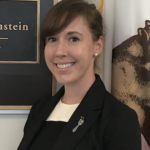Members of the ACR’s delegation to the House of Delegates (HOD) of the American Medical Association (AMA) are gearing up for the HOD Interim Meeting, slated for Nov. 14–18 in National Harbor, Md. The HOD, which includes more than 600 voting delegates and a corresponding number of alternate delegates from over 170 societies, meets twice a year to establish policy on health, medical, professional and governance matters. The ACR has been a member of this prestigious body since 1987.
Leading up to an annual meeting each June and an interim meeting each November, the delegates poll their colleagues and key ACR committees and consult with the ACR Board of Directors on the College’s top priorities. Then they develop and draft resolutions to bring forth for consideration by the larger HOD body.

Dr. Downey
Several members of the ACR’s delegation recently shared their reflections on the importance of this advocacy work and the issues that will be top of mind this fall.
Christina D. Downey, MD, current chair of the Government Affairs Committee, has been an ACR representative for the Young Physician Section of the HOD since 2019. Based on her own observations and discussions with colleagues, Dr. Downey expects that resolutions this fall will coalesce around three topic areas: protecting research funding and access to innovation; stemming dwindling physician reimbursement; and lessening regulatory burdens, such as prior authorizations and appeals.

Dr. Arriens
As a researcher focused on lupus, alternate delegate Cristina Arriens, MD, MSCS, clinical associate professor, Arthritis and Clinical Immunology Research Program, Oklahoma Medical Research Foundation, Oklahoma City, Okla., is particularly concerned about funding for rare diseases. In general, the uncertainty regarding National Institutes of Health (NIH) grants and other government funding may impede the ability to plan for research projects into the future, she notes.
The Long Game
Gary Bryant, MD, chair of the ACR delegation and professor of medicine (retired), Division of Rheumatic and Autoimmune Diseases, University of Minnesota School of Medicine, Minneapolis, Minn., has been involved with the AMA HOD as an ACR representative since 2003, first as an alternate and then as the delegate starting in 2007. Since 2013, he’s been joined by co-delegate Eileen M. Moynihan, MD, FACP, FACRH. The ACR delegation also includes Luke Barré, MD, a Young Physician Representative, and Colin Edgerton, MD, who serves as an alternate delegate.



